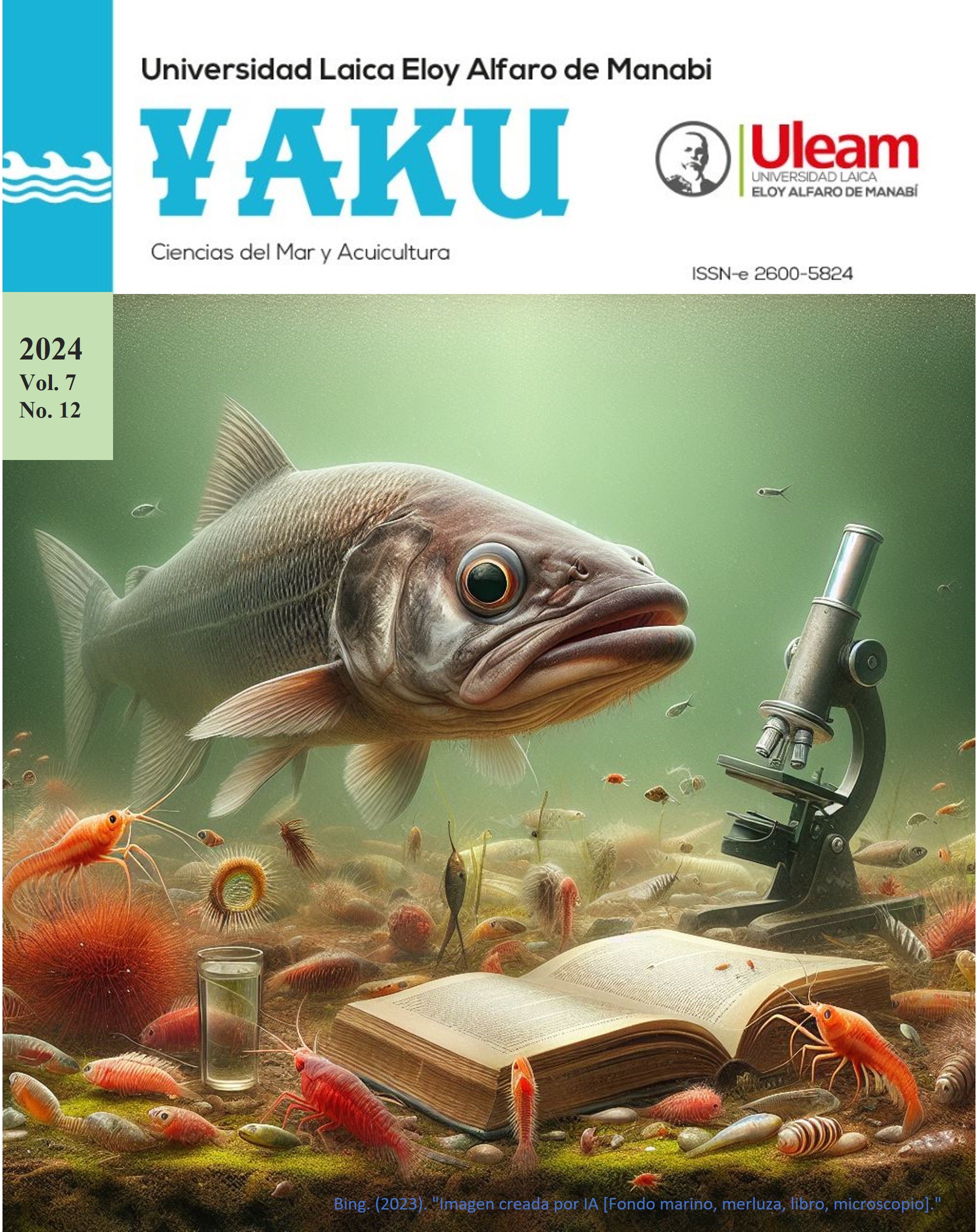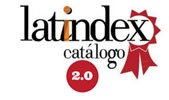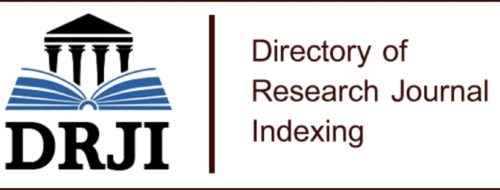Biological and Fishery Aspects of Hake (Merluccius gayi, Guichenot, 1848) Caught with Trawl Nets in the Gulf of Guayaquil, Ecuador.
DOI:
https://doi.org/10.56124/yaku.v7i12.002Palabras clave:
Gulf of Guayaquil, mesh size, trawl fishing, average size at maturity.Resumen
Fishery resources face challenges such as overexploitation, data scarcity, and climate change, highlighting the need to implement research strategies for effective management. Hake is crucial among Ecuador's fishery resources, thus periodic assessments of its status are essential. The size composition of Merluccius gayi caught with trawl nets in the industrial fishery was analyzed, as well as the capture size and its relationship with the size at sexual maturity, to provide a baseline for future studies and applications in the management of this fishery. Samples were obtained from landings in Puerto Bolívar, Province of El Oro, Ecuador, during November 2014 to March 2015. A total of 574 individuals were analyzed, with average capture size of 34.93 and 38.92 cm LT for males and females, respectively. The size-weight relationship showed a negative allometric growth for males and females, with exponent (b) of 2.30 and 2.55, respectively. It was observed that, with an 8.9 cm mesh size in the codend, the males’ Lr50 was 34.35 cm LT, which was less than the ASM of 34.75 cm LT. For females, the Lr50 (37.97 cm) was greater than the ASM of 37.28 cm. This shows the importance of analyzing gender information separately during the evaluation of fishing gear.
Descargas
Citas
Bourgois, F. (1966). El Instituto Nacional de Pesca y el Resultado de sus labores (1961-1966). Instituto Nacional de Pesca, Guayaquil, Ecuador.
Castro-Moreira, C. V., Flores-Rivera, G., & Tigrero-González, W. G. (2023). Variación temporal en tallas y madurez sexual de merluza común (Merluccius gayi, Guichenot, 1848) de la pesca con palangre de profundidad en aguas ecuatorianas. Revista De Ciencias Del Mar Y Acuicultura YAKU. ISSN: 2600-5824., 6(11), 1–12. https://doi.org/10.56124/yaku.v6i11.543
Cerna, J. F., & Oyarzún, C. (1998). Talla de primera madurez sexual y fecundidad parcial de la merluza común (Merluccius gayi Guichenot 1848) del área de la pesquería industrial de la zona de Talcahuano, Chile. Investigaciones Marinas, 26, 31-40. https://doi.org/10.4067/S0717-71781998002600004
Coello, D., Herrera, M., Castro, R., Medina, C., & Salcedo, J. (2017). Caracterización de la pesquería artesanal de merluza (merluccius GAYI) en la caleta pesquera de Santa Rosa (provincia de Santa Elena). Revista Científica Ciencias Naturales y Ambientales, 11(1), 12-21.
FAO. (1995). Código de Conducta para una Pesca Responsable (Primera, Vol. 1). FAO, Rome.
Gálvez, M., & Rebolledo, H. (2005). Estimating codend size selectivity of bottom trawl net in Chilean hake (Merluccius gayi gayi) fishery. Investigaciones Marinas, 33(2). https://doi.org/10.4067/S0717-71782005000200003
García-Fernández, C., Suca, J. J., Llopiz, J. K., Álvarez, P., Domínguez-Petit, R., & Saborido-Rey, F. (2021). Spatial and temporal variability in the occurrence and abundance of European Hake larvae, Merluccius merluccius, on the Galician shelf (NE Atlantic). Frontiers in Marine Science, 8, 696246. https://doi.org/10.3389/fmars.2021.696246
García-Domínguez, M., Gilces, I., Lavayen, F., Daza, C., Bermúdez, C., Avila, E., & Cevallos, A. (2014). Pesquería del recurso merluza (Merluccius gayi) en el Ecuador Continental 2013. Informe técnico No. 1. Ministerio de Agricultura Ganadería y Pesca, Viceministerio de Acuacultura y Pesca, Ecuador.
Hernández-Téllez, A. R., Cajas-Flores, J. M., Ordiano-Flores, A., Calle-Morán, M. D., & Bucheli-Quiñonez, R. J. (2024). Feeding habits of the South Pacific hake, Merluccius gayi, in Ecuador, Tropical Eastern Pacific Ocean. Ocean and Coastal Research, 72, e24034. https://doi.org/10.1590/2675-2824072.23151
Holden, M. J., & Raitt, D. M. S. (Eds.). (1975). Manual en ciencia pesquera. Parte 2. Métodos para investigar los recursos pesqueros y su aplicación (Rev. 1). FAO Doc. Tec. Pesca (115). FAO.
Instituto del Mar del Perú. (1996). Estudio de la selectividad en Merluza (Merluccius gayis peruanus) con red de arrastre de fondo en el área de Paita (Informe técnico No. 120). Perú: ÍMARPE. Recuperado de http://biblioimarpe.imarpe.gob.pe:8080/bitstream/handle/123456789/864/INF%20120-1.pdf?sequence=1
Instituto Nacional de Pesca. (2014). Aspectos Biológicos Pesqueros de la Merluza (Merluccius gayi) en los Principales Puertos de Desembarque durante el 2014. Recuperado de http://www.institutopesca.gob.ec/tecnicos-del-inp-realizaron/
Instituto Nacional de Pesca. (2018). Merluza. Recuperado de http://www.institutopesca.gob.ec/merluza/
Iwamoto, T., Eschmeyer, W. N., Alvarado, J., & Bussing, W. A. (2010). Merluccius gayi (Informe técnico No. 1). Estados Unidos: IUCN. Recuperado de http://www.iucnredlist.org/details/183527/0
King, M. (1995). Reproduction and recruitment, 151-165. In M. King (Ed.), Fisheries Biology, Assessment and management. Fishing News Books.Lorencio, CG. 1996. Ecología de peces. Universidad de Sevilla.
Legaki, A., Chatzispyrou, A., Damalas, D., Sgardeli, V., Lefkaditou, E., Anastasopoulou, A., Dogrammatzi, A., Charalampous, K., Stamouli, C., Vassilopoulou, V., Tserpes, G., & Mytilineou, C. (2024). Decline in Size-at-Maturity of European Hake in Relation to Environmental Regimes: A Case in the Eastern Ionian Sea. Animals, 14(1), Article 1. https://doi.org/10.3390/ani14010061
Martínez, J., & Madirolas, A. (1991). Áreas de Distribución y Abundancia de los Recursos Demersales con énfasis en el recurso merluza (Merluccius gayi) en la Plataforma Continental del Ecuador. Boletín Científico Técnico del Instituto Nacional de Pesca del Ecuador, 11(3), 1. Recuperado de http://www.oceandocs.org/bitstream/handle/1834/2970/DISTR%20Y%20ABUND%20DE%20LOS%20RECURSOS%20DEMERSALES....pdf?sequence=1&isAllowed=y
MAGAP. (2008). Investigación Pesquera Campaña Ecuador (Boletín Técnico) (p. 64). Ministerio de Agricultura, Ganadería y Pesca-Viceministerio de Acuacultura y Pesca. Recuperado de http://acuaculturaypesca.gob.ec/subpesca296-informe-de-investigacion-pesquera-campana-ecuador-2008-2009-y-2010.html
MAGAP. (2009). Campaña de Investigación Pesquera-Ecuador (Boletín Técnico) (p. 116). Ministerio de Agricultura, Ganadería y Pesca-Viceministerio de Acuacultura y Pesca. Recuperado de http://acuaculturaypesca.gob.ec/subpesca296-informe-de-investigacion-pesquera-campana-ecuador-2008-2009-y-2010.html
MAGAP. (2010). Campaña de Investigación Pesquera Ecuador (Boletín Técnico) (p. 130). Ministerio de Agricultura, Ganadería y Pesca-Viceministerio de Acuacultura y Pesca. Recuperado de http://acuaculturaypesca.gob.ec/subpesca296-informe-de-investigacion-pesquera-campana-ecuador-2008-2009-y-2010.html
MAGAP. (2013). Acuerdo Ministerial 018 Merluza. Ministerio de Agricultura, Ganadería y Pesca-Viceministerio de Acuacultura y Pesca. Recuperado de https://camaradepesqueria.ec/wp-content/uploads/2016/02/Acuerdo-Ministerial-018-Merluza.pdf
Mawa, Z., Hossain, Md. Y., Hasan, Md. R., Tanjin, S., Rahman, Md. A., Sarmin, Most. S., & Habib, K. A. (2021). First record on size at sexual maturity and optimum catchable length of 10 marine fishes from the Bay of Bengal (Bangladesh) through multi-models approach: A key for sound fisheries management. Environmental Science and Pollution Research, 28(28), 38117-38127. https://doi.org/10.1007/s11356-021-13491-8
Mytilineou, C., Herrmann, B., Kavadas, S., Smith, C. J., & Megalofonou, P. (2020). Combining selection models and population structures to inform fisheries management: A case study on hake in the Mediterranean bottom trawl fishery. Mediterranean Marine Science, 21(2), Article 2. https://doi.org/10.12681/mms.22191
Munro, J. L., & Pauly, D. (1983). A simple method for comparing the growth of fishes and invertebrates. Fishbyte, 1(1), 5-6.
Pavéz, P. (1989). Implicaciones de una medida de regulación. Situación del tamaño mínimo de malla en redes de arrastre en la pesquería de merluza común (Merluccius gayi Guichenot 1848). Revista Pacífico Sur (Número especial), 717–726.
Parker, K. (1985). Biomass model for the egg production method. In R. Lasker (Ed.), An egg production method for estimating spawning biomass of pelagic fish: Application to the Northern Anchovy, Engraulis mordax (NOAA Technical Report NMFS, 36), 5-6.
Perea, A., Buitron, B., & Meckleburg, E. (1998). Condición reproductiva y maduración temprana de la merluza Merluccius gayi. Crucero de evaluación BIC José Olaya Balandra 9806-07. Instituto del Mar del Perú, Informe No. 138. Recuperado de http://biblioimarpe.imarpe.gob.pe/bitstream/123456789/1533/1/INF%20138-5.pdf
Queirolo, D., Gaete, E., & Ahumada, M. (2013). Gillnet selectivity for Chilean hake (Merluccius gayi gayi Guichenot, 1848) in the bay of Valparaíso. Journal of Applied Ichthyology, 29(4), 775–781. https://doi.org/10.1111/jai.12209
Rahman, M. M., & Samat, A. F. (2021). Reproductive cycle, sexual maturity and fecundity of Nemipterus furcosus (Valenciennes, 1830). Aquaculture and Fisheries, 6(4), 424-431. https://doi.org/10.1016/j.aaf.2020.07.006
Reeves, S. A., Armstrong, D. W., Fryer, R. J., & Coull, K. A. (1992). The effects of mesh size, cod-end extension length and cod-end diameter on the selectivity of Scottish trawls and seines. ICES Journal of Marine Science, 49(3), 279–288. https://doi.org/10.1093/icesjms/49.3.279
Revelo, W. (1995). Distribución y abundancia de los recursos demersales en la plataforma continental del Ecuador durante octubre de 1995. Boletín Científico Técnico del Instituto Nacional de Pesca del Ecuador, 14(2), 1-39.
Sparre, P., & Venema, S. C. (1997). Introducción a la evaluación de recursos pesqueros tropicales (Vol. 1). FAO Documento Técnico de Pesca 306/2 Rev. 2. FAO. Roma.
Subsecretaría de Pesca-Chile. (2001). Tamaño de malla mínimo en pesquería de merluza común y otras regulaciones en redes de arrastre (Informe Técnico No. 44) (p. 28). Chile.
Ricker, W. E. (1975). Computation and interpretation of biological statistics of fish populations. Bulletin of the Fisheries Research Board of Canada, 191, 382 p.
Williams, K. (2007). Evaluation of the macroscopic staging method for determining maturity of female walleye pollock Theragra chalcogramma in Shelikof Strait, Alaska. Alaska Fishery Research Bulletin, 12(2), 252-263.
Yu, M., Herrmann, B., Liu, C., Zhang, L., & Tang, Y. (2023). Effect of Codend Design and Mesh Size on the Size Selectivity and Exploitation Pattern of Three Commercial Fish in Stow Net Fishery of the Yellow Sea, China. Sustainability, 15(8), Article 8. https://doi.org/10.3390/su15086583
Zar, J. H. (2014). Biostatistical analysis (5th ed.). Pearson.
Descargas
Publicado
Cómo citar
Número
Sección
Licencia
Derechos de autor 2024 Revista de Ciencias del Mar y Acuicultura YAKU. ISSN: 2600-5824.

Esta obra está bajo una licencia internacional Creative Commons Atribución-NoComercial-CompartirIgual 4.0.


1.jpg)













